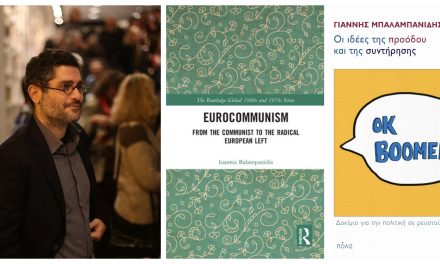Evi Gkotzaridis is a historian with interests in historical Revisionism, 20th century Irish history and the ‘long’ Greek Civil War period (1946-1974). She was born in Thessaloniki and raised in Paris. She holds a PhD in Irish History and Politics from the Sorbonne Nouvelle (Paris III).
Gkotzaridis’ publications include”Trials of Irish History: Genesis and Evolution of a Reappraisal, 1938-2000” (2006) and “A Pacifist’s Life and Death: Grigorios Lambrakis and Greece in the Long Shadow of Civil War” (to be published – May/June 2016: View Extract). She currently works on a wider project under the title: “Revisionism in 20th Century Historiography: Dangerous Hermeneutics and Experiments in Objectivity”.
Evi Gkotzaridis spoke with Rethinking Greece* about her latest book on Grigorios Lambrakis**, the ‘long’ Greek Civil War period, the “deep” state, the historical parallels between Ireland and Greece, studying historical revisionism in a comparative framework, as well as democratic processes and today’s ideology of economism.
How did you become interested in the life of Grigorios Lambrakis?
My family moved to France during the Junta. I grew up in Paris, in a sort of illusive bubble. For most of my adolescence, I was cut off from my origins and culture. Even though I attended a Greek school once a week, I was only now and then aware of my ‘difference’ for Paris was back then a powerful cosmopolitan blender. My family never spoke of the past and my few tentative questions usually fell on deaf ears. They were focused on the future not the past, and behaved as if the past was an emotional encumbrance. But one day I watched ‘Z’ (the political thriller of Costas Gravras) on French television and the bubble dissolved suddenly. In hindsight, I can tell that watching this movie was an eye-opening experience. It was tantamount to what the Irish intellectual Conor Cruise O’Brien once called, ‘the feelings preceding the thought’. It was a massive awakening, even though at that stage I understood little of the political background that had led to the assassination of that personality. And yet, at that moment, I decided semi-consciously that I would write about him one day.
What were the characteristics of the post-Civil War period in Greece?
The years between 1949 and 1967, that is until the Colonels’ coup d’Etat, is a period characterized by poverty, institutional imbalance, a vying for supremacy between different power centres, rabid anticommunism at the level of the State, a great deal of social discontent and agitation, a political culture premised on a protracted ‘state of emergency’, and more generally, a persistent lack of freedom hiding behind the façade of a nomocratic and democratic order.
One of the ways in which this State anti-Communism expressed itself was the phenomenon of para-constitution, or if you prefer, copious rules of exception that reduced Communists at best to second-class citizens, at worst to outright enemies. One should remember that as late as 1962, roughly 1.100 men were still held in prison for crimes they had committed during the December 1944 clashes in Athens (“Dekemvriana“), even though Winston Churchill had intervened personally around the time of the Varkiza Agreement to bind the Greek Government to the principle of ‘no proscription’. This principle meant that no man ‘ringleader or otherwise’ would “be punished for his part’’ in the December fight.
Furthermore, the Right, which won the Civil War (1946-1949), is on the horns of a great dilemma: On the one hand, there is a progressive current within it that wishes to modernize Greece. Hence, women obtained nominally the right to vote and stand as candidates in legislative and municipal elections on 28 May 1952, even though the law remained dormant until 1956 when Constantine Karamanlis stepped in as Premier and finally implemented it.
Karamanlis is also the architect of the country’s accession to the European Economic Community (EEC). A convinced Europeanist who believed that Europe was Greece’s intrinsic destiny and that membership would act both as stabilizer and repairer of a social fabric that had been torn apart by the Civil War, he worked hard to that end until he secured a first accession agreement in 1962 and, after the tragic interlude of the dictatorship, he resumed his efforts, which culminated with the signing of the full treaty of accession in May 1979.
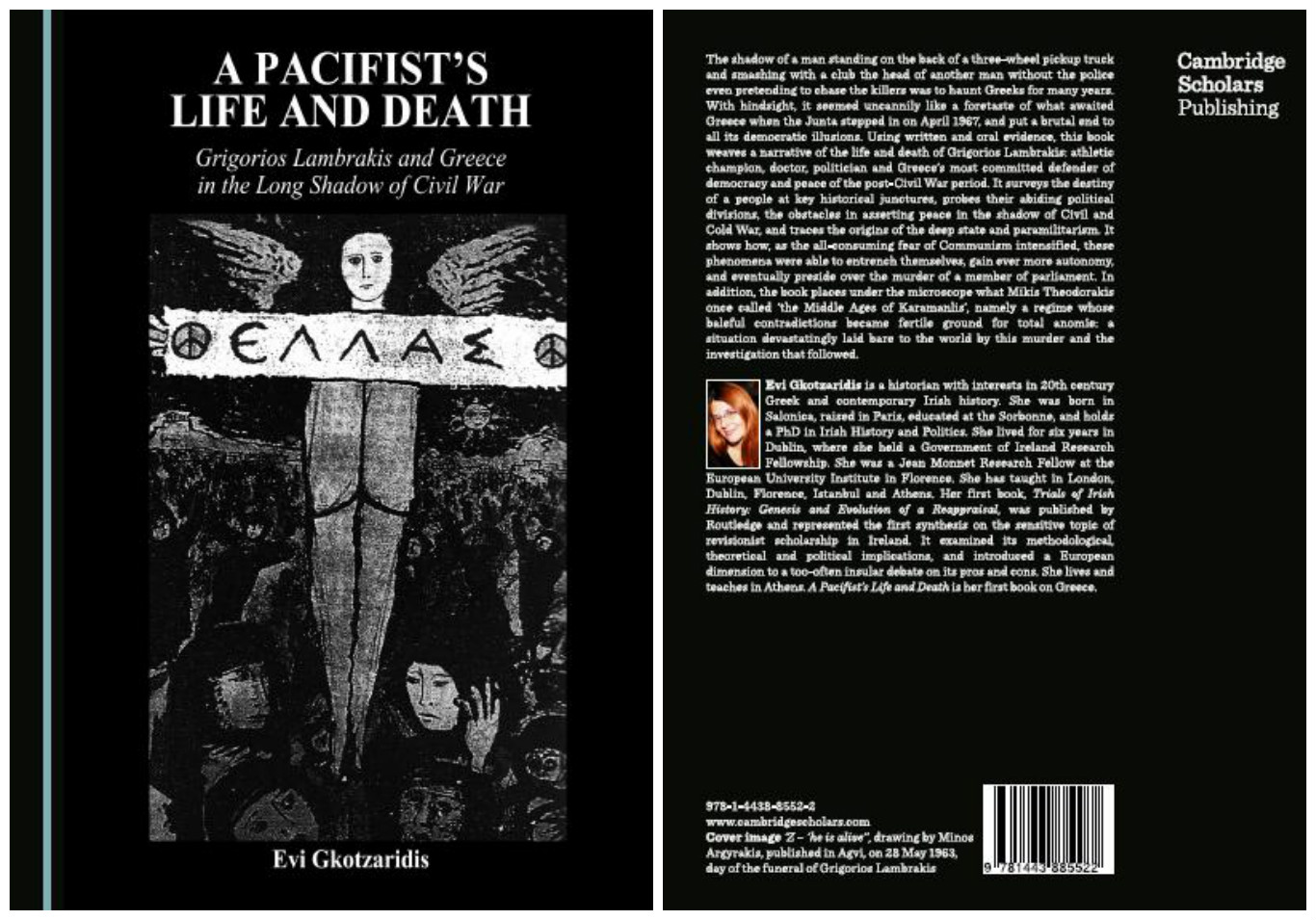 On the other hand, all through the 1950’s and 1960s’, there is a strong authoritarian current inside the Right, having a single-minded obsession and that is Communism and its perceived eternal threat. This current believes firmly that Greece escaped Communism only by a whisker in the 1940’s and is inclined to interpret any erosion of its political hegemony or any popular shift towards the centre ground as leaving the backdoors open to this fifth column again.
On the other hand, all through the 1950’s and 1960s’, there is a strong authoritarian current inside the Right, having a single-minded obsession and that is Communism and its perceived eternal threat. This current believes firmly that Greece escaped Communism only by a whisker in the 1940’s and is inclined to interpret any erosion of its political hegemony or any popular shift towards the centre ground as leaving the backdoors open to this fifth column again.
This authoritarian element is profoundly distrustful and scornful of the normal workings of democracy and also quite prepared to violate the popular will by various unorthodox or underhand methods if the situation demands it. Historians know now that the results of the October 1961 elections that returned the Right to power had been obtained through the use of some fraud and a significant amount of violence and intimidation, and that these far from being isolated and spontaneous actions, were most likely the outcome of a well-prepared secret plan cooked up by the Secret Services and the Army, a plan called ‘Pericles’.
Inside this authoritarian current, there were people like Panagiotis Pipinelis, former advisor to King George II, who enjoyed the absolute trust of the Throne and who, later in 1967, felt no qualms about lending respectability to the dictatorship by accepting his co-option as Foreign Minister. We find also a man like MP Nikolaos Farmakis, who in an article published in 1961 -in a review pointedly called ‘Our Struggle’- compared the holding of the forthcoming elections to ‘the coming of chaos’ as he predicted the formation of a united front between Centre and Left, or a Left-wing challenge to the results through armed insurrection! To Georgios Papandreou’s demand, who was then leader of the Centre, that these elections be carried out under the stewardship of an interim government to ensure fairness, Farmakis retorted without batting an eyelid that there was something superior to popular sovereignty and the safeguarding of the results’ authenticity and that was the ‘national interest’!
At the apex of this authoritarian current, we find the Throne, which is also fiercely anti-Communist. As I mentioned before, the Right is not altogether a homogeneous or unanimous block: within it at least two other institutions vied fiercely for ‘absolute’ power and tried to prevail over the Government which they tended to relegate to the status of expendable commodity when it became insufficiently compliant with their demands. These institutions were the Crown and sections of the Army, both of which constituted effectively the bastions of ultra-conservatism in Greece and fancied themselves as the only true defenders of the endangered post-Civil War status quo. Therefore, Greek political life of that time is marked by a strange phenomenon of institutional anomaly or imbalance at more than one level.
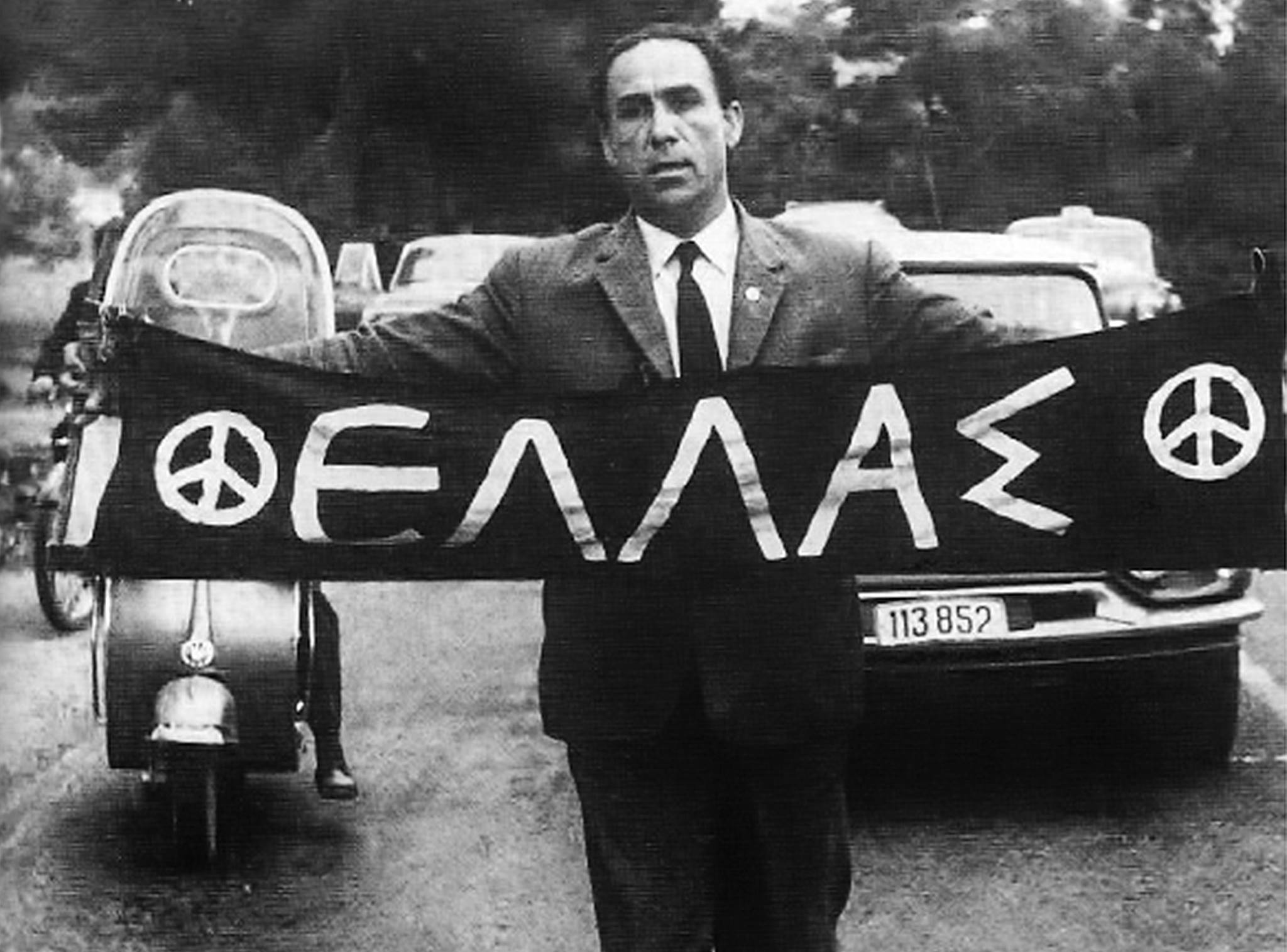 Your research reveals a lot of details concerning the functions of the “deep” state. What are your main conclusions on this issue?
Your research reveals a lot of details concerning the functions of the “deep” state. What are your main conclusions on this issue?
The murder of independent deputy Grigorios Lambrakis and the journalistic and judicial investigation that followed, shed light on another permanent trait of those years which is the existence of a deep state, to use the Turkish phrase, or parastate, as it is known in the Greek context. Since the Left revealed its new popular appeal by emerging as the first Opposition Party in the 1958 general elections, it had often complained that a ‘junta’ already existed and was pulling the strings behind the curtain of official power. On the other end of the political spectrum, one often heard that Greek democracy needed to be kept on a tight leash because it was not mature enough to discern the false lures of Communism and steer clear of a future collaboration with it.
The way devised to do that, short of completely destroying the façade of democracy, was the maintenance of the “deep state”. This should be understood as an ‘invisible’ Executive, not accountable to Civilian will and its traditional representatives, ie., Parliament and political parties, that had succeeded in infiltrating the Army, police and intelligence services and operated in the shadows in order to ‘guide’ policy away from domestic initiatives that could have spelled the end of the Cold War quarantining of the Left.
It is noteworthy that even inside the ranks of the newly-reconstituted Centre (aka Centre Union), a party whose leadership remained resistant for a long time to the emergence of a moderate form of Leftism shorn of its revolutionary mantle as was EDA (United Democratic Left) then, and to any collaboration with it, acute concern was voiced sometimes for a governmental behaviour that seemed to too tolerant, or downright complicit with the activities of these ‘invisible’ forces. This criticism became more strident and widespread when it became apparent that the deep state was capable of hitting ‘indiscriminately’ and showed no qualms in impeding the political expression of the Centre too, as it did during the controversial October 1961 elections.
This deep state comprised of State officials, Army and Gendarmerie officers, Secret Services agents and paramilitary groups, some of which appear to have been legal. On the heels of Lambrakis’ assassination, which the authorities and Right-wing Press rushed to portray as an ‘unfortunate accident’, the journalists (Georgios Romaios, Georgios Bertsos and Ioannis Voultepsis) reporting on the case had managed to secure a significant batch of confidential documents originating straight from the Athens and Salonica Divisions of the Service of Information, which then were attached to the Premier’s Political Office.
Based on the information they found there, the journalists came to the conclusion that there had been direct links and communication between this State Service and the leaders of some of these paramilitary groups and that the latter had actually been channeling public money and issuing dangerous orders to groups of violent ‘indignant citizens’.
This phrase evidently does not carry the same meaning as nowadays. These people had not much in common with 21st Century European demonstrators, the ‘indignados’ of Spain or the ‘aganaktismeni’ of Greece, protesting against the dead-end of austerity policies, except perhaps the state of precarity in which some of them lived. Instead, the term represented a ironic euphemism or genteelism for anti-Communist cells of vigilantes whose job was to gather as ‘counter-demonstrators’, break up political meetings, manhandle, terrorize and more generally obstruct the political expression of the Left and its ‘fellow-travellers’. Needless to say, all this activity was orchestrated from the upper echelons of this deep state.
Hence, instead of involving the police directly in the unpalatable job of political repression, risking exposure and having to confront public opprobrium, those pulling the strings had found a safer mechanism through which to express their anti-Communism with more leeway and ‘panache’. Finally, it would seem that some of the personalities who formed this deep state on different levels and were implicated in the process of sabotaging the Left’s political revival and undermining the proper functioning of democracy in the lead-up to dictatorship, had collaborationist antecedents or at least were tainted heavily by the suspicion.
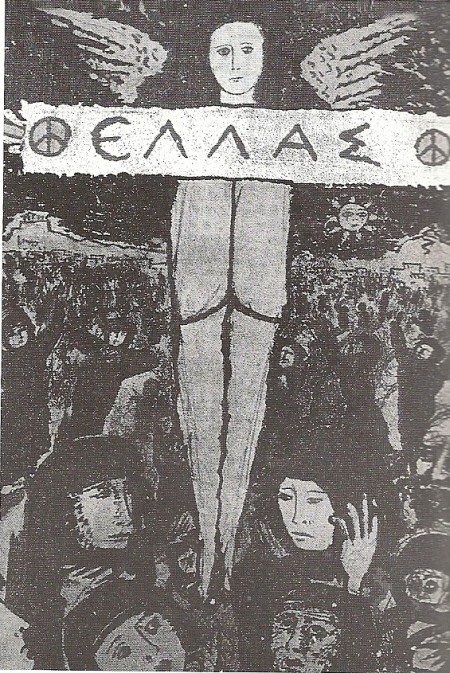 Minos Argyrakis‘ drawing, picturing Grigorios Lambrakis, published at the Avgi newspaper the day after Lambrakis death (28.5.1963)
Minos Argyrakis‘ drawing, picturing Grigorios Lambrakis, published at the Avgi newspaper the day after Lambrakis death (28.5.1963)
Is the history of this period important for today’s Greece?
The existence of a deep state all through the post-Civil War period is a disquieting phenomenon. Its relatively smooth co-existence with a parliamentary system of government remains undoubtedly one of the greatest conundrums of Greece’s modern history. Although, at first sight, this phenomenon of co-existence may look as a major contradiction or paradox, in hindsight it seems that the words ‘dualism’ or ‘ambivalence’ are perhaps more appropriate here to describe the complexity of the situation.
Certainly, it is because of the tolerance of these ‘unaccountable and inscrutable elements’ that the dictatorship of 21 April 1967 was able to gestate and entrench itself more firmly. Naturally, this begs the uncomfortable question of why the Right-wing Government did not do enough to stop these elements in their tracks, particularly in view of the fact that the Govermnent was aware of their activities. It is hard to avoid the conclusion that at some point the Government decided that these ‘unaccountable and inscrutable elements’ could prove useful to it.
The history of this period inevitably raises the question of how far we have progressed since, or how watertight or safe from similar arbitrary encroachments are democratic processes in 21st century Greece and elsewhere. There is in my opinion a new and even more extreme form of omnipotent ideology at work in Europe nowadays, and that is economism. Its buzzword, austerity, has been imposed by the TROIKA on Greece, Ireland, Spain and Portugal and reduced their respective governments and parliaments to mere rubber-stamping mechanisms, incapable of considering the actual human cost behind such budgetary orthodoxy.
Are there any historical parallels between Ireland and Greece?
Ireland was my first research laboratory and was – I realized later – also a means of approaching the troubled history of my own country. Even though Greece and Ireland tended to be little aware of each other in the past – a situation that the current financial crisis has changed – there are arresting similarities between them. Foreign occupation (Turkish/English), famine (1940’s/1840’s), Civil War (Right/Left – Pro-Treaty/anti-Treaty), poverty, the harrowing experience of emigration, the proximity of a sectarian conflict (Cyprus/Northern Ireland) and of course major differences: the Right/Left divide never took hold or became entrenched in Ireland the way it did in Greece; it was in fact overshadowed by the more lasting Catholic/Protestant distrust and the historical split within the anti-colonial and Republican movement.
There is, I believe, an inherent factionalism, a profound rebellious spirit, you may say, both among the Irish and Greek people, which continues to prove a great obstacle when the situation demands national solidarity and the overcoming of a greater enemy or challenge. Moreover, a lasting legacy of the civil war in both countries has been an unhealthy compartmentalization of the body politic between ‘patriots’ (sound nationalists) and ‘traitors’ (often an infinitely extensible category) and this original rift has often been used by the subsequent political elites as a way of deflecting attention from real social and economic inequalities. So from the start, Ireland as an object of research drew me in because it had a ‘familiar’ ring.
Written in honour of Irish revolutionary hero Michael Collins (1890-1922), Brendan Behan’s song ‘The laughing boy’, or ‘To gelasto paidi’ in its Greek translation, has come to stand for various Greek historical figures and events and is one of the most recognised songs of the last 40 years in Greece (Read more: Who was Theodorakis’ ‘laughing boy’? How Greeks came to love a song by Irish writer Brendan Behan)
What are the similarities and differences of the relevant historical debates?
In both countries, there have been various attempts to re-appraise history, often in order to understand unresolved political problems and conflicts that continue to cast their troublesome shadow over society. This work of re-appraisal or ‘revision’ is at once necessary and perilous, because more or often than not it is nearly impossible for a historian, even a well-meaning and honest one, to break free from her ideological preferences.
Thus, one is confronted with an arresting paradox: sometimes those who present their new findings as deriving from the use of an ‘objective’ method are not prepared to acknowledge that they too participate in the pragmatics of an already existing ideological discourse or that their findings can and are often hijacked and harnessed to boost the credibility of a specific discourse. That is why it is not enough for historians to claim that ‘revision’ is the bread and butter of historical scholarship because the discovery of new data and the application of a new method are more likely to bring us closer to the ideal of ‘truth’. Rather, they are better off becoming more self-reflexive and looking more closely at how their arguments and conclusions may be instrumentalized, so to speak, in order to whitewash crimes or shift historical responsibilities around.
More generally, the over-politicization in the historiographical field is a fact, probably inevitable, especially nowadays in view of this unprecedented financial crisis and the resulting tensions inside the EU. Something of the sort seems to be at play for example in the recent controversy sparked by Heinz Richter’s conclusions on World War II Resistance in Crete and the unprecedented readiness of a Rethimno Prosecutor to charge him under the newly introduced anti-racism Law with “denial of defamatory nature of the Nazi crimes committed against the Cretan people.” In my view it would be naïve to consider Richter’s arguments and conclusions as well as the reaction they have provoked outside this context of European crisis and tensions.
The captious propaganda campaign by some European media and leaders to lampoon Greece as a ‘childish’ nation or an economic pariah, bereft of discipline, industriousness and decency, in need of harsh punishment, has gingered up the feeling of nationalist indignation and led understandably to a spectacular re-opening of old wounds. Sensitive questions that for six decades were put on the back burner, like the never-claimed Occupation loan and the mostly relinquished wartime reparations that followed the 1953-Allied agreement in London -endorsed also by Greece- to write off over 60% of Germany’s debt, have been pushed back on the agenda. One should not forget that behind the revival of these questions, oftentimes casually dismissed as a sleight of hand of an incorrigible people dead set against changing or paying its debt, and however ill-timed it may be from a tactical point of view in the opinion of some, lies a grief of bewildering magnitude; a grief not honoured and consequently never overcome.
To come back to your question in a more precise manner, there are indeed parallels to be made between the more recent Greek and Irish revisionist discussions. The revisionist re-appraisal of Irish nationalism started in a moderate fashion as early as 1938 and happened to coincide with the advent of a more professional and organized historical discipline. Yet this critique of the nationalist narrative assumed a much more radical form in the 1980’s and 1990’s because of the Northern Irish conflict, the failure of all political solutions and the ongoing tragedy as reflected in the IRA terror campaign, the loss of life and the general state of anomie.
In other words, the onset of the Troubles in the late 1960’s, over thirty years of violence and particularly the IRA’s claim that they derived their moral mandate from the 1916 Easter Rebellion, had a traumatic and catalytic effect on the generation of historians who reached maturity then. It became a natural reflex for them to disown to different degrees the violent republicanism that the Rebellion had embodied and their scepticism for that political route increasingly turned into a radical doubt, targeting not only the means but also the ends of Irish nationalism.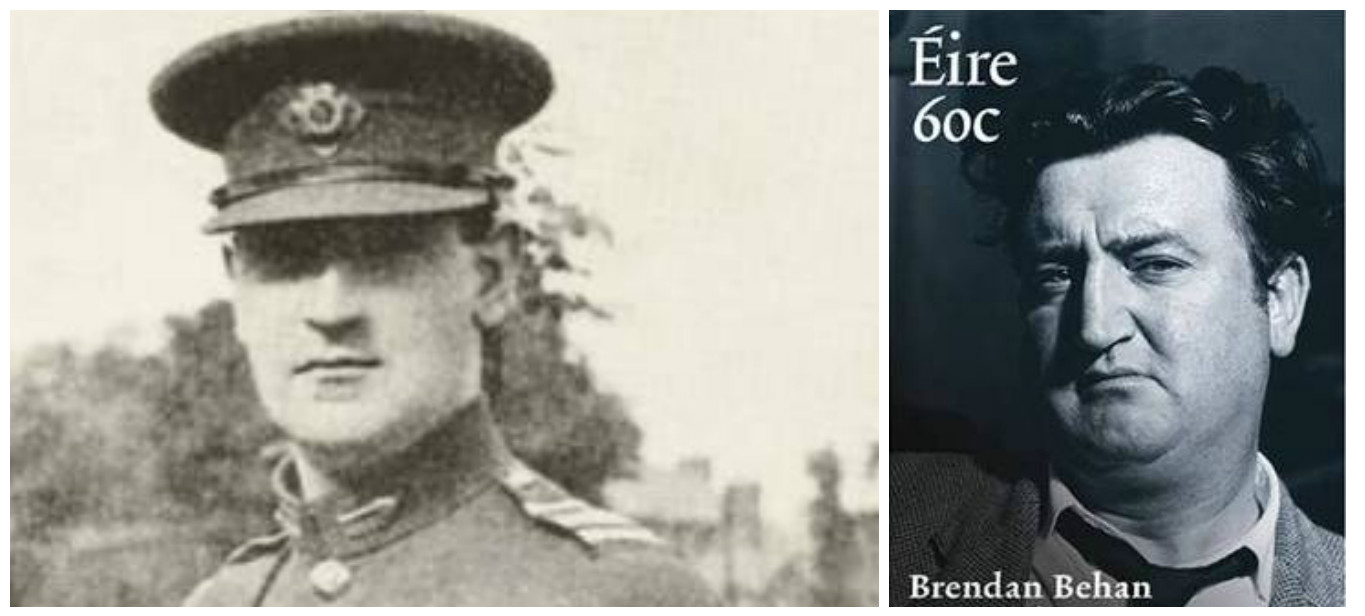 Greece, on the other hand, followed the historiographical path of Eastern Europe by initiating a new revisionist phase after the collapse of Communism, in practice in 2000. Predictably, its focus was the grand narrative of the 1940’s and its target primarily the Left. And yet, interestingly enough, despite this difference in timing, some of the changes experimented with in the patterns of interpretation and explanation of historical phenomena are undeniably similar.
Greece, on the other hand, followed the historiographical path of Eastern Europe by initiating a new revisionist phase after the collapse of Communism, in practice in 2000. Predictably, its focus was the grand narrative of the 1940’s and its target primarily the Left. And yet, interestingly enough, despite this difference in timing, some of the changes experimented with in the patterns of interpretation and explanation of historical phenomena are undeniably similar.
One such pattern is the recasting of the wars of Liberation as civil wars, as with the sectarian component of Protestants versus Catholics in the Irish anti-Colonial struggle of 1916-1923, or with the ideological component of Communists versus Fascists or even Liberals during World War II in Greece. Moreover, both Irish and Greek revisionisms display a tendency to look at liberation or resistance movements with stern scepticism. They underplay their truly ‘national’, ‘democratic’ and ‘popular’ character and foreground their politically or religiously ‘sectarian’ character instead. Combatants are treated as cold warriors which fight not in order to defeat an imperialist invader but to impose their own political and social order. In the Irish example, the traditional portrayal of the Old IRA as a non-sectarian and ecumenical force fighting for collective freedom has been called into question, most openly in the work of Peter Hart. In the Greek example, the question of the Left’s responsibility in the slipping into Civil War has been raised and this is understandably perceived as a deliberate attempt to destroy the moral capital it gained as a result of its successful leadership of the largest resistance movement during the war.
More precisely, scholars like Stathis Kalyvas and Nikolaos Marantzidis have questioned the most axiomatic assumption in the study of the Civil War since the fall of the Junta; chiefly that the Left was the main victim of violence. It was an assumption which could gain credence because the Left had lost in the Civil War and suffered heavy persecution in its aftermath – pursued with renewed vigour during the regime of the Colonels (1967-1974) – but also because references to Left-wing terror were often dismissed as an appalling lie cooked up by the Greek Right.
The new focus on this violence, on its ‘bureaucratic’ and ‘centrally-directed’ character, as pointed out by Kalyvas is perhaps a necessary addition to the task of refashioning the general mast of Greek historiography with more objectivity and comprehensiveness. However, when doing so, one must be careful not to forget the general historical context or silence the asymmetric power relations largely favourable to the German-collaborationist camp. In the Irish context, the cold warring does not oppose Communism to Fascism but one should nevertheless be cognizant of the fact that Irish historiography followed a similar outer interpretative path, notably in its willingness to explore the extent to which the country’s skidding off into civil war in the 1920’s and sectarian conflict in the 1970’s and 1980’s could not be explained away convincingly by continual and sole reference to the divide and conquer policies of Britain.
In fact, in both historiographies the focus of attention has shifted from the obsessive theme of foreign interference and the clear tendency to demonize it to an ever more courageous probing into domestic discord. This transpires in the new preoccupation with the phenomenon of wartime collaboration and the events of the civil war in Greece or the recognition in Ireland that partition of the island had not been something imposed from above but a “secession” occurring because of a severe “breakdown in human relations”. Hence in the 1980’s, the Marxist Nikolaos Svoronos had warned his colleagues that the view that Greece is “merely a stage for puppets whose strings are moved by alien lands is naïve for a historian, a mortal disease for history itself and an unacceptable alibi for politicians.” In a similar vein, John Whyte had shown the distance travelled by Irish scholarship when he wrote that “the internal-conflict approach to Northern Ireland [was] close to becoming a dominant paradigm.”
What is the value of studying historical Revisionism in a comparative framework?
Ultimately, I believe that it is useful to study changes in historical interpretations in a comparative manner essentially because it discourages superficial or banal claims to some form of national exceptionalism. With such study, one soon realizes that all historians grapple with similar challenging theoretical, moral and political problems when re-examining the grand narratives of Marxism or Nationalism. Finally, I think that it holds the potential to induce much more critical spirit at a pan-European level and convey the much-needed sense of a shared identity, providing of course that historical education in schools and universities is given a chance to fulfill its role with originality and vision and above all unimpeded by perceived political expediencies.
* Interview by Nikolas Nenedakis
**Grigorios Lambrakis (3.4.1912 – 27.5.1963) was a Greek politician, physician, track-and-field athlete, and member of the faculty of Medicine at the University of Athens. He was elected to the Greek parliament in October 1961 as an Independent collaborating with the United Democratic Left (EDA) which was Greece’s newly emerging umbrella left-wing party. Lambrakis was a pacifist who used his parliamentary immunity to march for peace, from Marathon to central Athens after the march had been banned by the authorities. Lambrakis’ ideal to free Greece from foreign influence captured the youth’s imagination. It also galvanized the Left which after a quarter of a century of Right-wing oppression wielded under the pretext of fighting Communism, was ready to embrace his goals of national reconciliation and universal peace. He was assassinated in Thessaloniki on a fateful evening of May 22, 1963, right after he had delivered a powerful speech, amid a frenzied crowd of Right-wing thugs and a totally passive police force. The Athens Classic Marathon, run every year in November, is dedicated to Grigorios Lambrakis.
The letter Z (lit., zei, means he is alive) became the rallying cry of the Greek youth who found in Lambrakis their new hero. Four years later, the Greek government was overthrown by the military Junta of 21 April 1967. In 1969, film director Costa Gavras released ‘Z’ (after Vassilis Vasilikos’ book), which tells the story of the assassination and the journalistic and judicial investigation that followed. ‘Z’ beautifully paced and deeply moving with the lyrical music of Composer Mikis Theodorakis became one of the cinematic sensations of the late sixties. It starred Yves Montand as Grigorios Lambrakis whose murder in the middle of a violent demonstration is covered up by State officials and Jean-Louis Trintignant as Christos Sartzetakis, a tenacious magistrate who is determined not to let them get away with it.
See also: Evi Gkotzaridis: ‘Who Will Help Me to Get Rid of this Man?’ Grigoris Lambrakis and the Non-Aligned Peace Movement in Post-Civil War Greece: 1951-1964; “The Music of Mikis Theodorakis” blog: Grigoris Lambrakis, symbol of democracy;



